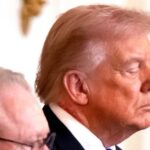
–>
September 14, 2022
One of the most hallowed traditions of the U.S. republic is a commitment to the ideal of the Rule of Law. Therefore, one of the most dystopic aspects of our current politics is that this ideal is under deliberate attack.
‘); googletag.cmd.push(function () { googletag.display(‘div-gpt-ad-1609268089992-0’); }); }
The list of assaults is long and varied. Consider:
- Biden’s cancelation of student loan debt and the EPA rule recently struck down by the Supreme Court, both of which are instances of the habitual efforts of the Executive to seize upon supposed statutory ambiguities to claim vast powers never contemplated by Congress, and to use this to transfer resources to favored constituencies.
- The treatment of the January 6 defendants, who are being deprived of constitutional rights; subjected to harsh punishments for trivial offenses; and railroaded by politically motivated prosecutors, judges, and juries.
In these cases, and in a host of others, it is not believable that the contempt for the Rule of Law is an accident or oversight. It is an essential feature, intended to demonstrate that the Rule of Law no longer has substance, that, in the classic words of A Man for All Seasons, the laws have been cut down, and we are naked to the winds that now do blow.
So how did we get here?
‘); googletag.cmd.push(function () { googletag.display(‘div-gpt-ad-1609270365559-0’); }); }
One can quibble about the precise contours of the Rule of Law, but the basic definitions are available from many sources, including the Encyclopedia Britannica (via Wikipedia) and the website of the United States courts.
Less often discussed is the nature of opposition to the Rule of Law. One automatically thinks of the struggles against despotism, and despots do indeed resist, because what is the fun of being a despot if one has to bow to the law?
Despotism is important, especially in the context of current politics, in which the parties tend to be coalitions of special interests. The term “despot” can encompass a tyranny of the majority, including a log-rolling coalition of special interests that coheres into a majority by agreeing to the demands of each member.
But a focus on despotic ambitions should not obscure the importance of ideological opposition to the Rule of Law.
The primary example of this is a political party of the style called Leninist. The starting point for the enterprise is the conviction that the members of the party have insights into the nature of political and economic reality that are not vouchsafed to the populace at large. The people labor under the burden of false consciousness, not grasping their true interests, and must be guided by the party.
Because the party already knows the truth, and knows that some people’s understanding of it is superior, it must oppose the Rule of Law, which assumes that truth is hard to find and that everyone must be treated equally in the quest for it. The very idea of truth becomes malleable, and comes to be defined in practice as whatever promotes the interests of the party.
‘); googletag.cmd.push(function () { googletag.display(‘div-gpt-ad-1609268078422-0’); }); } if (publir_show_ads) { document.write(“
For the Russian and Chinese flagship Leninist parties of the 20th century, the ideological glue, the special insight into reality, was Marxist economic and political theory, but other faiths can do this as well.
Modern U.S. Progressives can choose between two ideologies: wokeness, which sees everything through the lens of power relationships between victims and oppressors, or the climate change panic that sees everything in terms of CO2 and its equivalents.
Acolytes of these ideological cores can increase their effectiveness by allying with aspiring despots, including special interests that can profit from the implementation of the ideologies, and by offering advancement for opportunists eager to climb aboard any rolling bandwagon.
This combination of those opposed to the Rule of Law is powerful. In addition, its defenders suffer the great handicap that, while everyone in a society has an interest in maintaining the Rule of Law as a general standard, in any particular case, many parties have an incentive to subvert it to promote their immediate interests (and devil take the long run).
In political theory, this condition is called the tension between “constitutional interest” (in a fair and functioning system) and “particular interest” (in one’s immediate advantage). It is also part of the family of issues under the umbrella of the “prisoners’ dilemma,” situations in which people can benefit in the long term from cooperation but have strong short-term incentives to double-cross one another.
This mismatch between constitutional and particular incentives provides an opening for the ideological opponents of the Rule of Law to gain allies among those who can profit by undermining it. And once destruction starts, it tends to snowball. If everyone else is cheating, one is a fool, or a saint, to keep the faith.
It is not surprising that societies living under the Rule of Law have not been common. The U.S. adherence to it for 250 years, though often imperfect, is remarkable.
The primary reason for its persistence has been the great bulwark that devotion to the Rule of Law, and to its enshrinement in the Constitution, is a civic religion to Americans. It expresses most profound sense of how things ought to be.
For opponents of the Rule of Law, this civic faith is a bar to their ambitions. Actions like the treatment of the January 6 defendants and the student loan cancelations are deliberate attacks on this civic faith, designed to send the message “the Rule of Law does not control us, and faith in it is for suckers. Give up.”
So supporters of the Rule of Law must refuse to give up, and must not give those in the mushy middle a free pass to give up. But they must also recognize that their opponents are not simply making a mistake that will be corrected once it is brought to their attention. Undermining the Rule of Law is a feature, not a bug.
James V DeLong is a graduate of Harvard Law School, where he was an editor of the law review. He has been research director of the Administrative Conference of the United States and is the author of numerous works on administrative law and policy, including Ending ‘Big SIS’ (the Special Interest State) and Renewing the American Republic.

Image via Free Stock Photos.
<!– if(page_width_onload <= 479) { document.write("
“); googletag.cmd.push(function() { googletag.display(‘div-gpt-ad-1345489840937-4’); }); } –> If you experience technical problems, please write to [email protected]
FOLLOW US ON
<!–
–>
<!– _qoptions={ qacct:”p-9bKF-NgTuSFM6″ }; ![]() –> <!—-> <!– var addthis_share = { email_template: “new_template” } –>
–> <!—-> <!– var addthis_share = { email_template: “new_template” } –>







